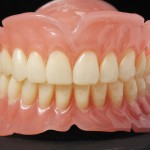
With the advances in preventative dentistry one consequence has been patients becoming edentulous later in life. Accepting and adapting to conventional complete denture can be extremely challenging both physically and psychologically. There is now good evidence to support implant supported mandibular overdentures (Feine et al., 2002) using standard implants.
The aim of this review was to evaluate the use of mini-implants (diameter <3mm) to retain complete over-dentures in terms of survival, marginal bone loss, satisfaction and quality of life (Lemos et al, 2016).
Methods
The review followed the PRISMA statement (Moher et al., 2009) and was registered with PROSPERO. Searches were conducted in PubMed/Medline, Embase and the Cochrane Library database checking articles published up to September 2016. In addition, they conducted a hand search of high impact journals in the field of implant retained prosthodontics. The eligibility criteria were, randomised controlled trials (RCTS) or prospective studies published in English. Two reviewers independently selected studies for inclusion, abstracted data and assessed risk of bias using the Newcastle-Ottawa Scale. The primary outcome was the survival rates of the mini implants; and the secondary outcomes included marginal bone loss, satisfaction and quality of life with the mini implants when they were used for retaining overdenture prosthesis.
Results
- 24 studies (4 RCTs, 20 prospective observational studies).
- Risk of bias scores were 6 papers scored 9/9, 2 scored 8/9, 2 scored 7/9, 13 scored 6/9 and one paper scored 5/9
- A total of 2492 mini implants and 386 standard implants were placed in 896 patients.
- Mean age 65.93
- No formal meta-analysis was carried out
- Primary outcomes
- Mini implant survival rate of 92.32% over 1-7 years
- Maxillary arch implants had a higher failure rate at 31.17%
- Secondary outcomes
- Marginal bone loss below 1.5mm
- Overdenture prosthesis retained by mini implants exhibited a significant increase in retention, stability chewing, speaking, comfort, aesthetics and improvements in satisfaction/quality of life.
- Overdenture survival 90.58%
Conclusions
The authors concluded
Within the limitations of this study, the present systematic review indicates that the use of mini implants for retaining overdenture prosthesis may be considered an alternative treatment, since it presents high survival rates of mini implants, acceptable marginal bone loss, and improvements in variables related to satisfaction and quality of life of patients.
Comments
This systematic review adopted elements of the PRISMA protocol and identified a good number of prospective studies. A risk of bias analysis was undertaken with the authors scoring 10 papers as low risk of bias and 14 at a high risk of bias. Their outcome measurements were a combination of quantitative and qualitative data. Unfortunately, there was no meta-analysis undertaken and the survival rates given were missing both confidence intervals and a time frame. A quick review of the quantitative data provided by the review authors in table 2 revealed the mode for patients per study was 30 and the mode for follow-up was I year. The two comparison systematic reviews (Dantas et al, 2014; Raghoebar et al, 2014) which the authors concurred with reference high survival rates had similar extremely short follow-up periods and small sample sizes. The results from this systematic review therefore need to be interpreted with extreme caution due to problems with the external validity of the primary research and the synthesis of that data within the review.
Links
Primary Paper
Lemos CA, Verri FR, Batista VE, Júnior JF, Mello CC, Pellizzer EP. Complete overdentures retained by mini implants: A systematic review. J Dent. 2017 Feb;57:4-13. doi: 10.1016/j.jdent.2016.11.009. Review. PubMed PMID: 27888049.
Other references
Dantas Ide S, Souza MB, Morais MH, Carreiro Ada F, Barbosa GA. Success and survival rates of mandibular overdentures supported by two or four implants: a systematic review. Braz Oral Res. 2014;28:74-80. doi: 10.1590/S1806-83242013000600012. Review. PubMed PMID: 24402059.
Feine JS, Carlsson GE, Awad MA, Chehade A, Duncan WJ, Gizani S, Head T, Lund JP, MacEntee M, Mericske-Stern R, Mojon P, Morais J, Naert I, Payne AG, Penrod J,Stoker GT, Tawse-Smith A, Taylor TD, Thomason JM, Thomson WM, Wismeijer D. The McGill consensus statement on overdentures. Mandibular two-implant overdentures as first choice standard of care for edentulous patients. Montreal, Quebec, May 24-25, 2002. Int J Oral Maxillofac Implants. 2002 Jul-Aug;17(4):601-2. Review. PubMed PMID: 12182304.
Moher D, Liberati A, Tetzlaff J, Altman DG; PRISMA Group.. Preferred reportingitems for systematic reviews and meta-analyses: the PRISMA statement. PLoS Med.2009 Jul 21;6(7):e1000097. doi:10.1371/journal.pmed.1000097. PubMed PMID:19621072; PubMed Central PMCID: PMC2707599.
Raghoebar GM, Meijer HJ, Slot W, Slater JJ, Vissink A. A systematic review of implant-supported overdentures in the edentulous maxilla, compared to the mandible: how many implants? Eur J Oral Implantol. 2014 Summer;7 Suppl 2:S191-201. Review. PubMed PMID: 24977255.
Raghoebar, G. M., Meijer, H. J. A., Slot, W., Slater, J. J. R. and Vissink, A. (2014) ‘A systematic review of implant-supported overdentures in the edentulous maxilla, compared to the mandible: how many implants?’, European journal of oral implantology, 7 Suppl 2(November 2016), pp. S191-201.

[…] post Complete overdentures retained by mini implants. appeared first […]
[…] To read more about mini implants, I have just posted an appraisal of a recent systematic review on the Dental Elf blog (part of the National Elf Service). The post in here . […]
The aim of this review was to evaluate the use of mini-implants (diameter >3mm) -I think you meant to say <3 mm
Thanks Paul it was supposed to be <3 mm - I have amended it now
[…] Posted Dental Elf 10/03/2017 […]